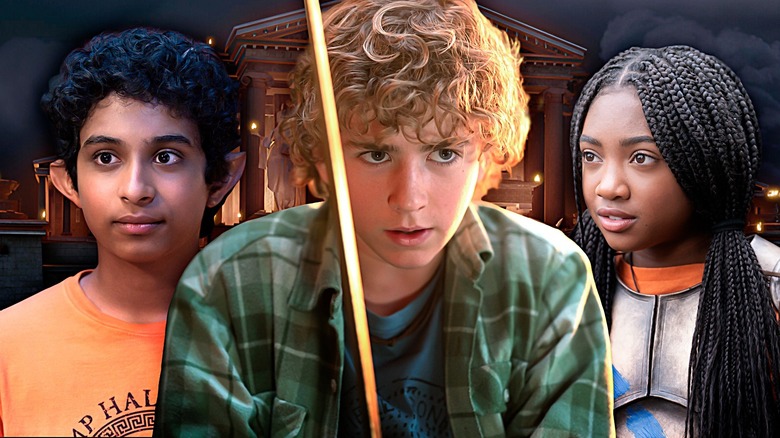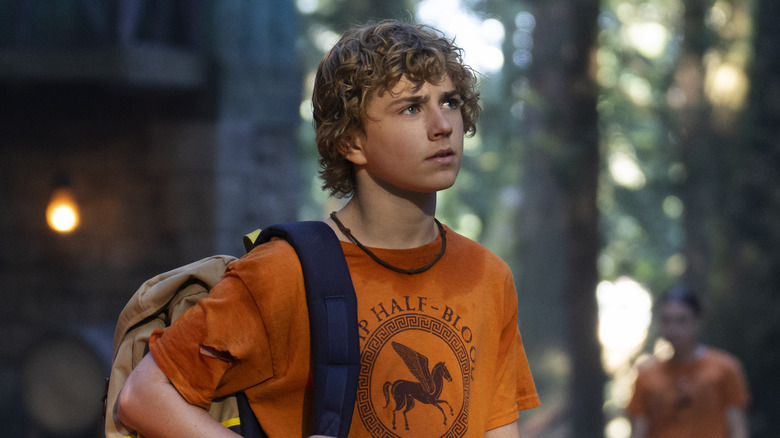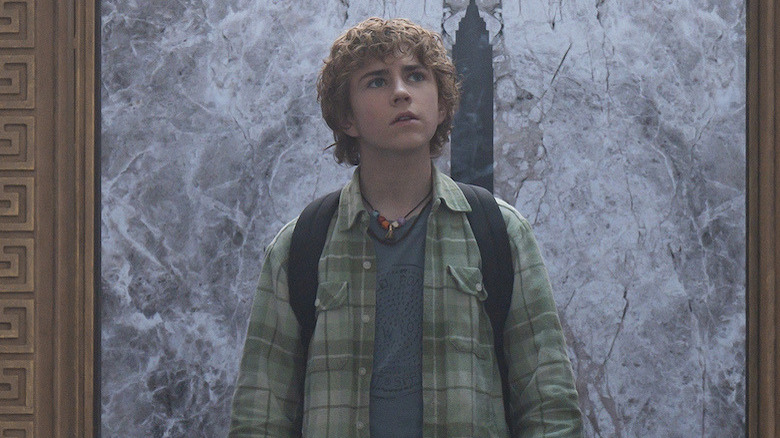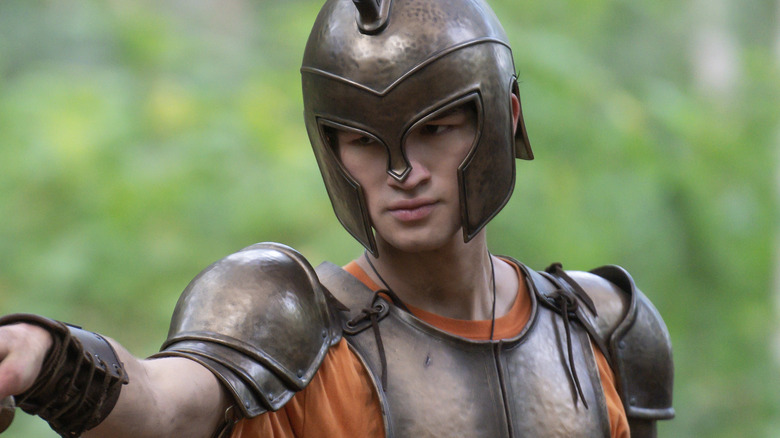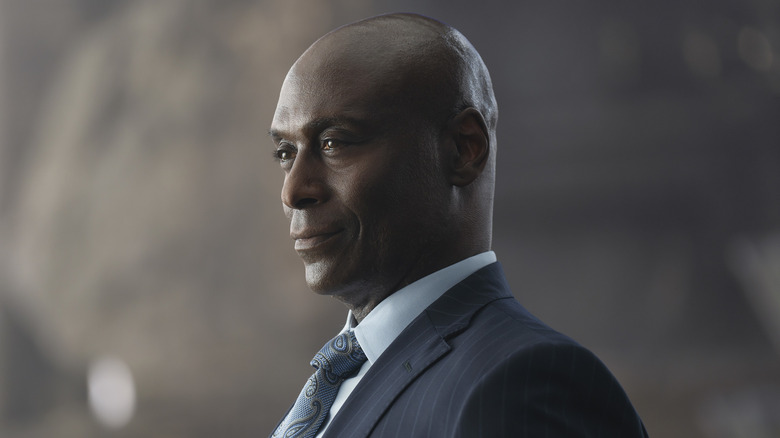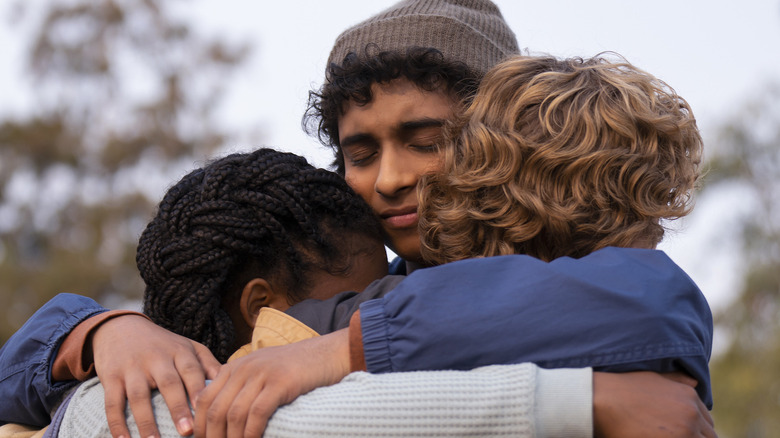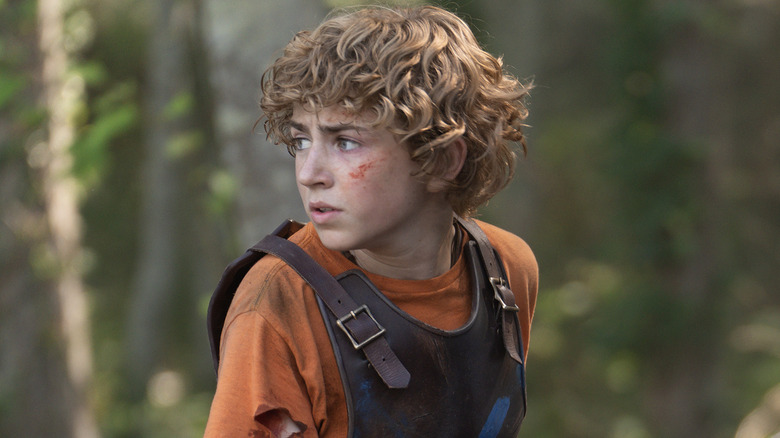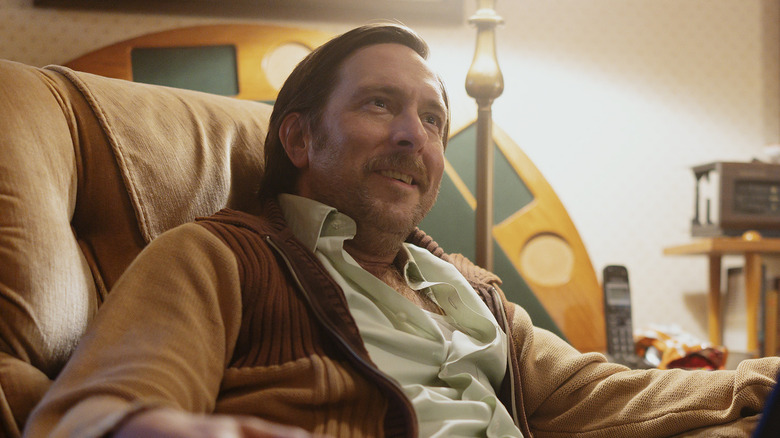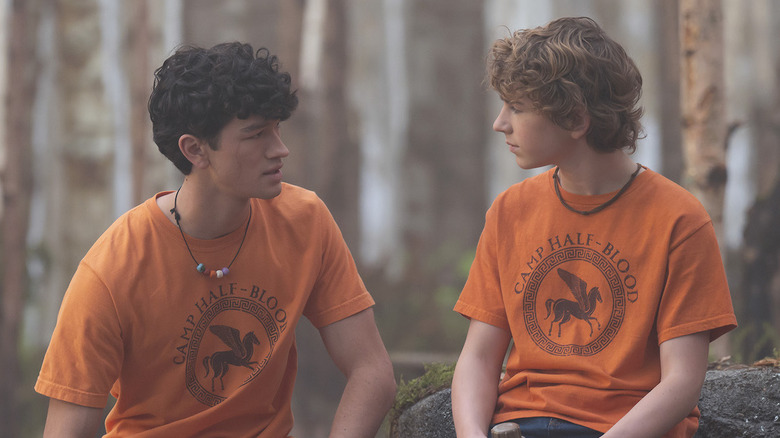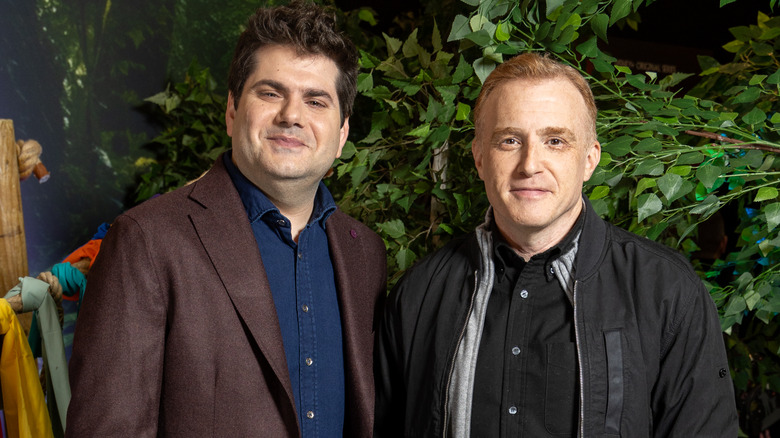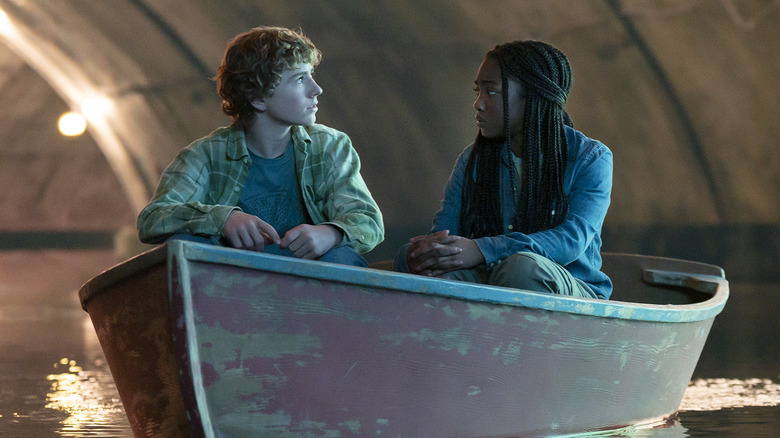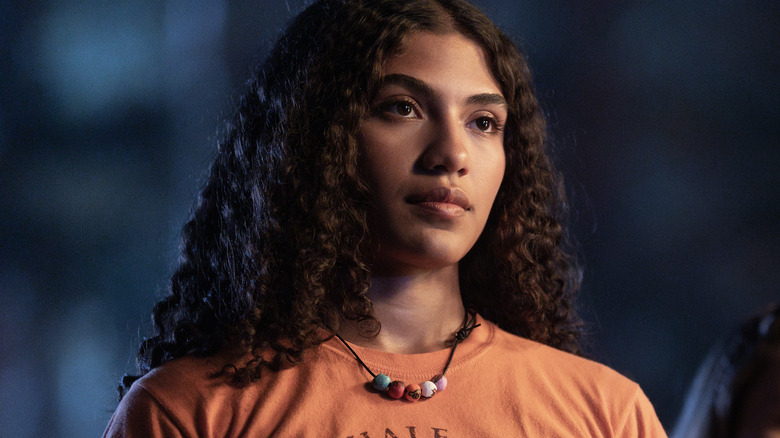The Ending Of Percy Jackson And The Olympians Season 1 Explained
"Percy Jackson and the Olympians" gives fans of the popular book series another chance to experience the iconic story of Percy Jackson on screens again, following a less-than-stellar film adaptation in the early 2010s. The Disney+ series, which boasts significant involvement from author Rick Riordan, introduces a new generation to the mythic journeys of three preteens trying to prevent a war.
Percy Jackson (Walker Scobell), Grover (Aryan Simhadri), and Annabeth (Leah Sava Jeffries) are trying to recover Zeus' (Lance Reddick) master thunderbolt after it's stolen from him. By taking it back, they hope to prevent war among the Greek gods. However, this world is new to Percy, who has just learned that his dad is a god. As he tries to rise to the challenge while navigating his new surroundings, danger seems to lurk around every corner (and every method of transportation).
Between a confusing prophecy, numerous Greek gods, and several near-sacrifices on their part, the trio has their work cut out for them. If you aren't sure how it all came together, we have the answers you're looking for. Don't forget to pack some golden drachmas as we head to Camp Half-Blood to share everything you need to know about the ending of the first season of "Percy Jackson and the Olympians."
What you need to remember about the plot of Percy Jackson and the Olympians
"Percy Jackson and the Olympians" follows Percy, a 12-year-old learning that there is more to his absent father than he thought. Percy is the son of Poseidon (Toby Stephens), the Greek god of the sea, making him a demigod or half-blood. After an incident at school gets him expelled, his mother Sally (Virginia Kull) and his best friend Grover, who is actually his satyr protector, take him to Camp Half-Blood. The camp protects demigods and prepares them for the monsters who are after them because of their pedigree.
While training, Percy goes on a quest to recover Zeus' stolen master bolt. The Greek god of the sky believes Percy stole it, so it's up to the preteen to figure out who did, take the bolt from them, and return to Olympus. He takes Grover and Annabeth, a daughter of Athena, with him on his journey. Armed with only the knowledge from the stories his mother told him growing up, Percy quickly gets in over his head and behind schedule.
They move west across the country to find an entry point to the Underworld. Hoping to recover the bolt and Sally (who has seemingly been killed but is said to be alive), the trio encounter a variety of Greek figures, from Medusa to Ares, and battle their way out of perilous situations. Along the way, the three bond and learn more about the dynamics of the gods.
What happened at the end of Percy Jackson and the Olympians
After leaving the Underworld, Percy fights with Ares (Adam Copeland) in a quick one-on-one match as Grover and Annabeth watch. The young son of Poseidon uses his affinity for the ocean to defeat the god of war, granting him both the bolt and the Helm of Darkness. Percy turns the Helm over to the fury Alecto (Megan Mullally) to take to Hades before traveling to the Empire State Building and Olympus.
On Olympus, he hands over the master bolt to Zeus and tries to communicate the threat that Kronos (Nick Boraine) poses to the rest of the gods. Zeus brushes him off, but Percy riles him up, almost resulting in his death. However, Poseidon steps in, surrendering to his brother if it means his son will go free.
When he returns to Camp Half-Blood, Percy realizes that Luke (Charlie Bushnell), not Clarisse (Dior Goodjohn), stole the bolt for Kronos. A face-off under the light of fireworks results in Luke escaping into a portal. Grover earns his Searcher's License, meaning he can start looking for Pan, the god of the wild. Annabeth decides to go spend some time with her father, traveling and going to Disney World. Percy heads to his home, eager to see if Hades held up his end of the deal and released his mother. However, the young demigod's life isn't completely back to normal. Kronos is still invading his dreams, and he and his mother are keeping track of what he says.
Who stole the thunderbolt?
While Zeus believes Percy stole the bolt, the young trio believes it was Clarisse, a daughter of Ares. However, with the help of the prophecy, Percy realizes Luke, the one who calls him a friend, is responsible for stealing Zeus' prized possession. Angry at the gods, Luke allows Kronos to manipulate him into helping cause war among them.
Father to Zeus, Poseidon, and Hades, Kronos the Titan was banished to Tartarus by his children. He is trying to regain his place in the world, but he can't do it alone. Luke is vulnerable to this because of his anger towards his father Hermes (Lin-Manuel Miranda). This feeling has transferred to the rest of the gods, making Luke willing to turn his back on everything he's learned at Camp Half-Blood in the hopes of being on a winning side that cares about him.
While Luke believes this could bring him glory, it will only lead to his downfall. Kronos is using Luke because he is replaceable and disposable. He uses the teen's anger to fuel him to do the unthinkable. If Kronos is successful, Luke won't receive credit or fame — he will simply be a stepping stone the Titan used along the way. In the media, teens are often used by individuals in power to push particular narratives. In "Percy Jackson," Kronos uses them to try to rise from Tartarus and defeat his children.
What did Percy fail to save in the end?
Before leaving on his quest, Percy listens to the Oracle of Delphi and its prophecy. It says that he "will fail to save what matters most in the end." The demigod believes this is a reference to his mother, whom he fails to physically save while in the Underworld. However, he fulfills his end of the deal with Hades, so she is returned. If she isn't who the prophecy is speaking of, what has Percy failed to save?
This line likely refers to the gods of Olympus. In the final moments of the series, the audience watches as Kronos communicates to Percy in his dreams, telling the preteen that Percy's "survival is the key to his return." Despite communicating the threat of Kronos to Zeus, the Titan is still in a position to return. He has Luke and the power of other gods like Ares. At this time, Percy fails to save the world because the gods don't take the threat of Kronos seriously. War is still imminent.
Should the series continue, we will see Percy struggle with the knowledge that, should he live, Kronos has a better chance of returning and starting a war with the other gods. The last time there was a war among the gods, World War II happened. It is a huge weight to put on the demigod's shoulders and one we haven't seen the outcome of yet.
The impact of found family
"Percy Jackson" talks about family a lot, from Percy trying to save his mother to Annabeth's avoidance of time with her father. While Percy is new to Camp Half-Blood, some demigods have been there for several years, creating a family with their half-siblings and other kids who understand what they're going through.
This is part of why Luke makes the decision he does. He has found a new family, one that has the same issues with their godly parents as he does. He thinks that by helping Kronos he can make things better for all the half-bloods, especially those on bad terms with their godly parents. They can prove their worth in that world and not be used for their bidding anymore. His decision, though fueled by anger, is rooted in the hope of doing something good for all half-bloods.
Luke is willing to do anything, even something that is "bad," to help his family. Annabeth acts similarly, trying to prevent Percy from sacrificing himself on numerous occasions, and willing to go against the instructions of a god to save Percy. While they are at very different levels on the morality scale, both demigods are willing to defy the expectations of the gods and their parents to do what they believe is right for their family. It shows just how much Camp Half-Blood and the friends they made mean to them.
Growing into your destiny can come at a cost
Over eight episodes, Percy grows into his power as a child of Poseidon, eventually using his ability to manipulate water to defeat Ares. He's growing into his destiny as a child of the big three, but at what cost? At just 12 years old, the demigod is tasked with essentially saving the world. While he had more time to be a child than other demigods, those days are gone. With Kronos implying that Percy's life directly correlates to the Titan's ability to break free from Tartarus, the preteen has an overwhelming amount of pressure to grow up sooner rather than later.
Percy is forced to become an adult before his time, having to make decisions that impact millions of people. While he gets to go home to his mother for now, as the threat of Kronos continues to grow, that may not be the case for much longer. In the wake of an arguably traumatic and intense situation, Percy leaves his childhood behind. What remains to be seen is how this impacts him later in life.
Annabeth gives a hint at where Percy could be emotionally. Though she is finally going to be a kid for a bit with her father, much of her life has been spent training to fight. Growing up in a less-than-conventional way hardened her and caused her to think more like an adult, losing any childlike wonder she once had.
What happened in the post-credits scene?
In the post-credits scene, Percy's stepfather Gabe (Timm Sharp) talks on the phone with a lawyer as he tries to get into the apartment, claiming that Sally has filed for divorce. She changed the locks, but that doesn't stop Gabe from opening a package addressed to Percy. It is Medusa's head, and Gabe becomes a statue in the hallway of the apartment complex.
Who sent the box back to Percy? The address label simply says "The Gods," but there is one in particular that has the biggest motive. Poseidon's surrender saves Percy from Zeus in the moment, but the demigod is still a forbidden child. Zeus may have sent the package in an effort to remove the threat Percy poses. However, one Redditor posits that maybe the delivery was from Poseidon. Reddit user mediocre_crochet "took this as Poseidon killing Gabe," which makes sense, considering Percy's last conversation with the god. His father won't answer whether he dreams about Sally, but the emotion that moves across his face says it all.
Sally initially marries Gabe to help shield Percy, even though the man isn't great. However, her son no longer needs that protection, which is why she's leaving the marriage. Poseidon sending the box, knowing Gabe would likely open it due to his proclivity to look at things that don't belong to him, helps the mother of his child be rid of a man she doesn't want anymore.
What the cast has to say about the ending
Luke tries to recruit Percy to his cause, but Walker Scobell doesn't think Percy would take him up on the offer. "He doesn't agree with the way that Luke is choosing to go about that," Scobell shared in an interview with the Los Angeles Times. He argues that the two are in the same boat about how the gods treat their children, but disagree on how to handle it.
The actor does believe his character has grown during the season. "This is the first time that he's stepping into who he's meant to be, the hero that people keep telling him that he has to be throughout the quest," he continued. "The whole time, like with the Minotaur fight [in the premiere], he doesn't really have any idea what he's doing, but this is the first time that he knows what he has to do."
Charlie Bushnell spoke to Luke's mindset at the end of the series. "By bringing Kronos back to life, I think there's a sense of glory there as well that he thinks he's somehow going to get," the actor detailed in the same interview. "I like that they switched that for the show where he tries to recruit him," Bushnell added. "I think it's going to make people more empathetic towards Luke and what he's feeling towards the gods." This could be especially true if the series continues.
What the co-creator has to say about the ending
Co-creator and co-showrunner of the series Jonathan E. Steinberg wants people to remember that this is a family story. "There's no corner of this world that he isn't connected to in this family story," Steinberg told the Los Angeles Times. "It's an awareness [for Percy] that, not only do I belong there, but every direction I look in is going to have really complicated, emotional, family terrain that needs to get crossed."
Steinberg dove further into this idea in an interview with Variety. "It's the closing argument for the story," he shared. "[Percy] sees something in that family that they don't even see for themselves ... It felt right that the end of the story is him having the courage to say it."
The co-creator also shared that the post-credit scene, and what it depicts, were planned from the beginning. "Gabe says he answers Sally's phone, so we assumed that he also opens her mail," he continued to the Los Angeles Times. "It seemed like him being hoisted on his own nosiness and doing it to himself felt like the proper, fitting end to our version of Gabe."
What the ending of Percy Jackson could mean for the series
The future of "Percy Jackson and the Olympians" is uncertain, but there is plenty of material for a second season. The series is an adaptation of the book series of the same name: The first season is based on the initial book, "The Lightning Thief," while a second season could follow "The Sea of Monsters," the next book.
"The Sea of Monsters" introduces new characters, particularly a sibling of Percy's, and sends our demigods on a quest to find the Golden Fleece to save Camp Half-Blood and Thalia's tree. Characters and villains from the first book appear, including the return of Luke, meaning fans could continue to see how these characters grow onscreen and how their stories change as the world does.
Even without a second season pick-up, the writers have already been brainstorming. Rick Riordan's wife and series executive producer Rebecca "Becky" Riordan shared on Threads that she has seen a script for the first episode of Season 2. "I love the first script for two and I even successfully pitched a couple of things that were included," she wrote. "We got a lot of world building out of the way in one so hopefully some smooth sailing ahead."
What the ending of Percy Jackson could mean for the franchise
With a more open-ended meaning to the prophecy, there isn't only room to continue "Percy Jackson and the Olympians," but to create other series in the universe. "Percy Jackson" is just one book series within the same universe, meaning fans of the show could see several other series happen. This could create a universe similar to what "The Walking Dead" has become.
There are character crossovers, new stories, and plenty of adventure to keep audiences engaged. The confirmed Easter egg of two characters in Episode 6 caused plenty of discussion in online fan communities, and this would only grow as fans continue to see new adaptations of books set in the same world.
It also gives Disney+ a chance to create another flagship universe. Its other properties, the Marvel Cinematic Universe and "Star Wars," are also in the sci-fi and fantasy realm, so a Greek mythology-based universe would be right at home and appeal to a different demographic. But while many of the series attached to the MCU and "Star Wars" are not family-friendly, "Percy Jackson" is designed with the entire family in mind.
